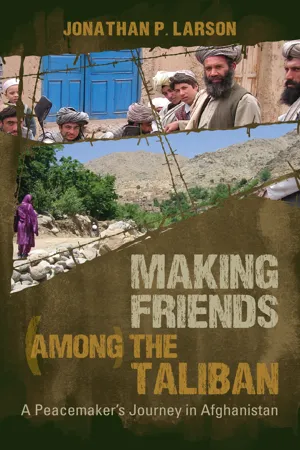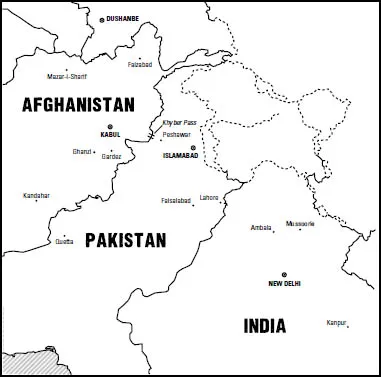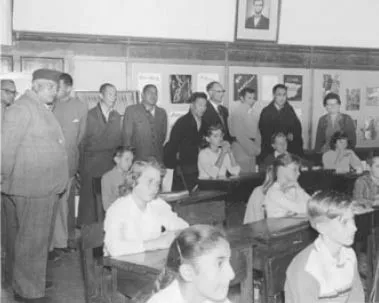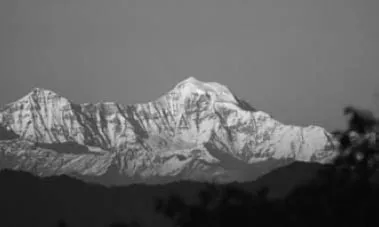![]()
1
Chosen by Afghanistan
I
Brass samovars of sweet, milky tea mark the quarter of Peshawar, Pakistan, that has long been called Qissa Khwani, or the “storytellers’ bazaar.” Though the tea shops are cloaked in fumes from the diesel trucks that have replaced the camel caravans, Qissa Khwani still stands for powerful stories that have fashioned the culture, identity, and worldview of this place. The tea and stories of these shops—whether in Qissa Khwani, Kandahar, Herat, Kabul, or countless smaller mountain towns—induce a camaraderie that seems a rare, stolen comfort against the backdrop of the region’s clamor.
Daniel Terry, of unkempt hair and beard and rangy frame draped in the traditional salwar kameez,1 often frequented these tea shops across Central Asia. He knew they served up a good deal more than sweet mountain brew. There the stories were spun. There the proverbs were rehearsed, often with bitter laughter. There ancient wisdom, fates, and prophecies were remembered. The tea shop served as apt school for the curious foreign infidel. But Dan—who in time acquired an Afghan version of his name, Dantri—was rarely content to remain in the cheery and reputable streetside seating of the tea shops. His instinct was to drift toward the back of the shop, where the sketchiest travelers would be murmuring over the gurgle of a hookah.2 Dan would offer some self-deprecating remark in Dari or Pashtu and settle himself next to those master storytellers of the tea shop shadows. When he would finally rise to excuse himself, he would be braced not only by the tea and stories but also by something rarer still: improbable friendship.
Dan and his tea shop companions would meet again somewhere—perhaps in earnest give-and-take over a hostage release, the safe passage of a truck laden with grain, or a roadside standoff. Perhaps they would come face-to-face in a blizzard, or when he was seeking agreement from village elders for a new clinic. Then they would know each other as mountain tea shop neighbors. And, as Dan would say, “You can build something with that.” Even fashion a peace.
II
Follow the fabled road leading west-northwest from the tea shops of Qissa Khwani to the outskirts of Peshawar. The road traces a hairpin history paved with glory, breakneck ambition, and a generous measure of folly. A sign along the way once read, “Anybody who was ever anybody passed this way.”
Past the old Kabuli Gate, the road leads you through fields and orchards and then climbs into rugged country. It runs past ruined ramparts, even a Buddhist stupa,3 and then up to a rocky mountain passage: the Khyber Pass. Beyond lie the storied ranges of the Hindu Kush, the ancient Silk Route, and the vast mountain knot of Central Asia. Like the colonial British redcoats, conquerors Darius, Alexander, Genghis Khan, Tamerlane, and Babur left their footprints and sometimes their tattered honor along this stony route.
Against this vast panorama, Dan’s journeys left but little trace—except upon him. There was hardly anything about the majestic peaks and ridges, the grudging valleys, or the defiance and lore of the people who call Afghanistan home that failed to set his imagination aflame. A friend of Dan’s puts it this way: “Dan did not choose Afghanistan. No, Afghanistan chose him.”
Dan’s fierce bond with Afghanistan had been prepared, laid up like kindling. As a boy he traveled with his Methodist parents, Patricia and George, from Pennsylvania to north India, where they lived for long stretches under the Himalayan eaves. His father crisscrossed the subcontinent as an auditor of mission schools and hospitals, sometimes spanning the great distances at the helm of a single-engine aircraft.
Dan spent his childhood and adolescence in the northern hill town of Mussoorie, India. Nothing pleased him quite so much as striding the foothills, sweaty and red-faced, following the trails of Nepali milkmen and donkey caravans that toiled along to the tinkle of their bells. To the north and east he could see the roof of that Himalayan world, whose summits were first crested in those very years by the likes of Tenzing Norgay and Edmund Hillary.
As a youngster in newly independent India, Dan also heard the stories of that pilgrim of moral heights, Mohandas Gandhi. Though felled by an assassin’s bullet in 1948, Gandhi lived on in the memory of a nation that could still hear his summons to satyagraha, the peaceable struggle for justice. Dan also crossed the path of the young Dalai Lama, who visited Dan’s classroom after a harrowing mountain escape from Lhasa, awakening Dan and his schoolmates to the struggle of the Tibetan people.
Those stories, shot through with heroic calling, resonated with what Dan observed in his own parents. His father, a conscientious objector during World War II, had served in an American mental hospital rather than join the military. It was the momentum of their convictions that eventually carried George and Patricia into missionary service in post-war India, and the footings of those convictions were writ large in the lecture halls and classrooms of Woodstock School, where Dan was a student. Beyond Pythagoras, Newton, Melville, and the Ramayana, Dan heard the thunder of biblical prophets: “Let justice roll down like waters, and righteousness like an everflowing stream” (Amos 5:24), and “The wolf shall live with the lamb … the calf and the lion and the fatling together, and a little child shall lead them” (Isaiah 11:6). From the Gospels, Dan memorized the phrases from Matthew 5 that Gandhi found so stirring: “Blessed are the poor in spirit … Blessed are the peacemakers.”
The young Dalai Lama (back row, second from right) visits Woodstock School in 1959 or 1960. Dan Terry is in the middle of the front row; Jonathan Larson (author) is on the far left in the last seated row. Other adults standing in the back include the school principal, members of the Tibetan entourage, and local Indian officials. Photograph by Thukral and Sons.
III
Dan’s childhood imagination teemed with machines. He never tired of sketching rakish planes or plowing his toy Land Rovers and snub-nosed World War II trucks through the dirt crevices and rocky terrain around the family’s mountain cottage, dreaming of smoky power and speed.
Such play, though, slowly gave way to an early adolescent suspicion of girls, whom he found unsettling. Unlike the toy railroad he had lovingly built, the world of cross-gender relationships seemed risky, even dangerous.
Demonstrating his capacity to lead—if not always in directions that reassured his Woodstock teachers—Dan framed a way to deal with these emerging problems of adolescence. At one point he devised an elaborate scheme to quarantine himself and his school friends from girls. They decided that even incidental contact with girls was defiling and that conversation between boys in solidarity with this scheme and any girls was taboo. Dismayed teachers at Woodstock struggled with classroom management, since Dan’s plan meant that any mixed-gender activities—even, for example, forays for collection of monsoon fern specimens—foundered. The boys’ silent solidarity left school administrators nonplussed and frustrated.
One day the girls countered with a culinary peace plan. They made a batch of brownies, which they presented to the boys as a peace offering. The boys—and their leader, Dan—recognized this for the Trojan horse that it was. Although most were school boarders and had not tasted homemade goodies for months, they left their brownies untouched on their desks at day’s end. Even the principal, a stern Anglican clergyman of persuasive powers, failed to crack this wall of adolescent resistance. Dan’s remarkable hold among his peers did not give way until hormones mercifully accomplished what eloquent appeals and threats could not.
As an adult, Dan later observed that heaven’s retribution for this scheme was to grant him three daughters, with whom he made lavish and exuberant amends.
IV
“He was a master of chaos theory,” one coworker says about Dan. The capacities to thrive in highly unpredictable environments, and to make friends with the prospect of surprise, Dan came by quite honestly. Indeed, he was thoroughly apprenticed in them by his harum-scarum family.
The twin peaks of Bandar Poonch in the Himalayas are visible from the ridge in Mussoorie, India, where Dan grew up. The Yamuna River rises in the Bandar Poonch glaciers.
One day Dan, his father, George, and some friends decided to raft the upper reaches of the sacred Yamuna River, northwest of Mussoorie. The road winds down steeply, past terraced fields to a river running between narrow valley walls. The group carried a borrowed inflatable dingy to the water’s edge, launched it, and soon was swept away in laughter and white water.
The beauty of the canyon walls, the river’s energy, and the battle to control the bobbing, spinning raft kept others from noticing what George began to see; the raft had a leak and was slowly collapsing in the roiling current. Left unchecked, the craft would eventually collapse on the rafters. Yet many miles remained.
In desperation, the group guided the raft to the valley wall, where they scrambled out onto difficult terrain. But they could not abandon the raft, for although crippled, it would have to be returned to its owner. While the rest of the party climbed away to the road to improvise a way out, George insisted on riding the raft solo out of the mountains. He shouted to them that he would meet them where the river emerged from the canyon. With that, Dan’s father was swept away beyond earshot.
After hitching a ride, Dan and the rest of the party gathered downstream at the river’s edge where the mountains give way to the Doon Valley. They scoured the Yamuna’s banks for any sign of George or the raft. Some began to wonder how they would organize a search or, in the worst case, convey dreadful news to the family.
Finally, as daylight faded, they heard a shout from the riverbank and saw the raft come sluicing out of the mountains, completely at the mercy of the current. Inside, nearly hidden from view, George was lying spread-eagle on the floor, holding the sagging raft open with his arms and legs fully extended.
This was not the only time the family barely survived to tell tales. After one of their periodic visits to North America, Dan’s parents and sister, Ruth set out for India, while Dan remained ensconced in university studies in Kansas. George, Pat, and Ruth picked up a single-engine aircraft in Europe, intending to fly it back to South Asia for use in George’s work. Loaded with gear and personal effects, they set out eastward, making hops around the Mediterranean and across western Asia, bound for India.
While crossing southern Afghanistan, they were startled when the plane’s radio crackled to life as Afghan officials ordered them to break off their route and divert immediately to Kabul. Air Force jets were scrambled to escort them to the capital. Once on the ground, Dan’s parents and sister were informed they had violated a strictly controlled military air corridor, although this had not appeared on any of George’s navigational charts. George apologized, pleading that his error was entirely innocent and that he was only returning with his family to their place of assignment in India.
It was some days before the authorities were satisfied that Dan’s father was telling the truth. They reluctantly agreed that the Terrys could proceed—but they would not be allowed to return south. Instead, they were obliged to fly directly eastward from Kabul to avoid repeating their earlier blunder.
George explained to the authorities that his plane would not be able to safely overfly the mountains separating him from Pakistan and India. Given the limitations of his aircraft and the weight of his freight and passengers, attempting such a route would be an invitation to calamity. But the authorities were in no mood to be cajoled.
With no options left, George fueled the plane lightly to avoid unnecessary weight. He said a prayer as he, Patricia, and Ruth lifted off and banked east under the watchful eye of Kabul air traffic control. For a time they paralleled the ridges, hoping they would find thermals that would lift them over the mountain crags. As George searched for updrafts, Patricia and Ruth began pitching items out of the plane in a last-ditch measure to lighten their load and gain altitude. At last, George caught a thermal that, with the lightened load, just lifted the plane over the watershed and sent them safely on their way to the Punjab.
Dan’s parents later returned to the scene of this desperate hour when George agreed to lead the International Assistance Mission (IAM) in Kabul, the agency under which his son would also come to serve.
Improvising a way in the face of long and chaotic odds came naturally to the son of such a family.
V
As Dan’s graduation in India from Woodstock School approached in the summer of 1965, his family made plans to return to North America. Considering conventional travel by ship or plane altogether too tame—a lost opportunity to test their mettle—the Terry family decided to cross Asia and Europe by road. After Dan’s graduation they would set out from India, drive overland to Rotterdam, and then cross the Atlantic by ship to New York. From there they would continue on to Baker University in Kansas, where Dan was enrolled for the fall semester.
In the post–World War II years, the road network between Pakistan and Turkey was chancy at best. Sometimes, signage consisted only of whitewashed oil drums marking shifting wilderness routes. Fuel could be adulterated and sparse, bridges were precarious, road conditions varied with the seasons, and travelers had to improvise accommodations. Some mountain passages harbored barbarous sheepdogs, and in lawless country, bandits held sway. At border crossings, edgy officials often wheedled for baksheesh.4 And should mechanical trouble occur, procuring spare parts could make minced meat of schedule, budget, and patience. Coups and the eruption of border quarrels might finish off the itinerary.
As it happened, several others expressed interest in joining this audacious family trek, and four additional passengers signed on for a total of eight long-distance travelers. By then, however, George had already ordered a five-passenger Volkswagen from Germany, for delivery to the port of Karachi. How could the additional travelers be accommodated so late in the game?
As the party began to gather for what was starting to resemble a major Himalayan campaign, George disappeared into the tinsmith’s bazaar. He could be heard clattering with his helpers in a nearby workshop, blowtorch in hand. Before long he emerged, blackened with grime but flashing a grin full of...



